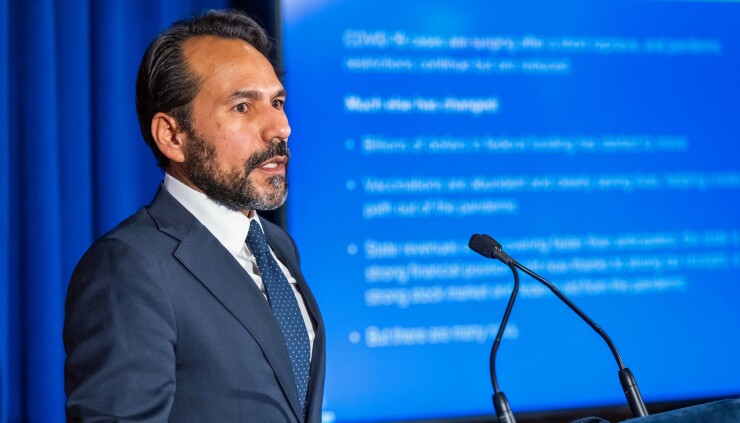Puerto Rico leaders and analysts highlighted fiscal risks facing Puerto Rico’s central government, including a change in how multinationals are taxed, that could, if unresolved, jeopardize future bond payments.
At the Puerto Rico Oversight Board meeting Wednesday, board Executive Director Robert Mujica Jr. said the government faced major risks in the coming fiscal years, including Medicaid funding, paying teacher and prison officer salaries and needing to fund a larger share of disaster relief on the island.
“I think the risks are real,” said Puerto Rico attorney John Mudd. and handling them “will depend on
The board will remain in force through 2031, he noted. “After that date, the government’s income may very well decrease, threatening payment of bonds.”
Darren McGee, Office of Gov. Kathy Hochul
“Fiscal risks identified by the PROMESA Board are very real, nothing new, and also very contingent on who wins the presidency of the United States in November,” said Heidi Calero, president of H. Calero Consulting Group.
Holders of Puerto Rico Sales Tax Finance Corp. (COFINA) bonds, she said, “should be concerned. I do not think Puerto Rico will be given another break with another bankruptcy.”
An economic growth plan is needed, Calero said, “to pull this economy out of the artificial respirator of federal funds that Puerto Rico does not control and which again will also be contingent on who is the next U.S. president.”
The local government used a one-time $460 million federal government payment to increase teacher and prison officer salaries, Mujica said. Officials will have to find a revenue source to replace that money.
The federal government may require Puerto Rico to make additional contributions to fund disaster relief projects,
Other financial risks facing the government carry a $1.5 billion price tag each year through 2028, Mujica said. For comparison, annual general fund revenues are projected between $12.1 billion and $12.8 billion.
“More rigor, more discipline and a keener focus on priorities must be the rule,” for the local government, Mujica said.
Gov. Pedro Pierluisi responded that his government’s spending was below projections in recent years and Congress would continue to allocate Medicaid for Puerto Rico at least at the current level.
The global 15% minimum tax on multinationals is a significant issue, particularly for Puerto Rico’s manufacturing sector, Pierluisi said. He said Puerto Rico’s Treasury Department is looking into how changes to local tax laws encourage foreign companies to remain in Puerto Rico and maintain the island’s tax base.
